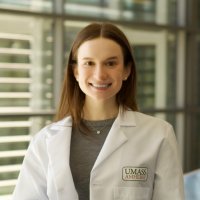
There is a particular energy behind some researchers that is hard to describe. It is most prominently felt in the way that they speak. When someone sits down with them and they are able to intricately describe their area of study without over-complicating it or getting lost in their own words, it becomes infectious to want to learn more.
Sarah Kaunfer, the winner of a UMass Amherst 21st Century Leader Award, is one of those researchers.
Though her roots hail beyond the University of Massachusetts Amherst, the dedication and care that she puts into her mission is nothing short of what UMass strives to embody. While Sarah has exemplified leadership qualities that unite and inspire researchers, she has expanded the intellectual climate of the field of medical device development by proposing the application of novel antimicrobials to implantable medical devices to inhibit infection.
Her desire to radically change our approach to infection prevention came from her own lived experience. Her grandfather passed due to a catheter-borne hospital-acquired infection. A close figure in her life, he was a driving force behind Sarah’s work ethic when entering the study of microbiology. Now, Sarah’s dedication to her work is not only in his name, but in the 30,000 Americans that pass due to said infection every year.
![]() It began with a transfer. Arriving from the University of Michigan, Sarah joined a team of researchers in iCons1 to study the application of antimicrobial materials to an implantable medical device. Her team, consisting of fellow researchers Simran Jeet, Phoebe Lasic-Ellis, and Hayley McIsaac, fired up their research during the infantile days of the COVID-19 pandemic. Without their invaluable contributions, there’s a chance we would not be talking about Sarah and their work right now.
It began with a transfer. Arriving from the University of Michigan, Sarah joined a team of researchers in iCons1 to study the application of antimicrobial materials to an implantable medical device. Her team, consisting of fellow researchers Simran Jeet, Phoebe Lasic-Ellis, and Hayley McIsaac, fired up their research during the infantile days of the COVID-19 pandemic. Without their invaluable contributions, there’s a chance we would not be talking about Sarah and their work right now.
While the world itself grinded to a halt, their research forged ahead.
“The idea was simple,” she said. “We sought to apply antimicrobial materials to an implantable medical device instead of waiting around for some antibiotic to work or to wait for the antibiotic coating which would become useless after only a few years.” As nearly every project does when under such a tight bind of scientific research, the ideas and composition of the project changed. Yet, the principles remained the same.
“This problem we have identified is not just in catheters, it’s all around us. Ventilators, pacemakers, you name it,” there is also a significant incidence of infections in artificial joints.
Her research has consisted of polymerizing materials and chemicals to repel bacteria from the surfaces of these implants…all in the goal of drastically reducing hospital-acquired infections. “By preventing the attachment of the bacteria, you’re preventing the infection.” Her team’s work has spanned across the campus, working with: Dr. Wilmore Webley, Dr. Al Crosby, Dr. Alan Robinson, Dr. Scott Auerbach, Dr. Jessica Schiffman, and Jacob Lindeman (iCons' Innovator in Residence). Whether it has been in the Crosby Lab or in the Webley Lab, their work on bacteria such as Escherichia coli and Staphylococcus aureus has been in the relentless pursuit of novel antimicrobials that prevent biofilm formation.
Of course, Sarah, Phoebe, Simran, and Hayley have had plenty of assistance from iCons itself. The structure of iCons greatly assisted them in honing their innovative research. They were trained to never settle for the answer that they have landed on and always question how they can improve their design. Even an answer that is correct or a work that has been given a perfect grade comes back with notes. “The idea of never settling has really helped our scientific process, but also to help us not get discouraged along the way. We came in with the iCons mindset.”
Sarah’s team has done, and will continue to do, an unexplainable service to the field of medical device development. Their work will continue to foster innovation and development in remedying the affliction of hospital-acquired infections. At the end of the day, Sarah is, of course, a UMass student. Her kind demeanor and eagerness not only to learn but to teach others is reflective of the kind of person UMass is lucky to have. But, what has separated Sarah from others that have passed through the Pioneer Valley is her ability to take difficult lived experiences and combine that with a passion for making a difference in millions of people’s health and wellbeing. This prestigious award is nothing short of deserved, and as Sarah moves onwards, her impact on not just UMass, but the study of microbiology and infection prevention strategy as a whole, will be enshrined in much more than the shine of the golden plaque.
Stay Connected